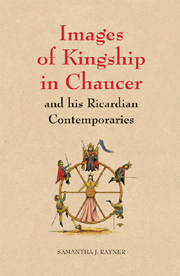1 - Gower: The Confessio Amantis
Published online by Cambridge University Press: 12 September 2012
Summary
Gower's Confessio Amantis is a very substantial poem. Its eight books run to some thirty thousand lines, about twenty-five per cent longer than the Canterbury Tales as we have it. It survives in over forty manuscripts, which preserve two main versions: the earlier recension dedicated to Richard II and the later, more critical of Richard's reign, dedicated instead to Henry of Derby, the future Henry IV. The earlier recension was written about 1390 and the later one about 1392–3. The poem was immediately popular, and very soon translated into portuguese and Spanish, an unusual and expensive undertaking. Caxton printed a version in 1483, and Shakespeare adopted gower as a narrator in his Pericles, which also uses Book VIII of the Confessio as a source for the story of Apollonius.
Gower wrote two other long poems, the Mirour de l'Omme (1376–9) in French and the Vox Clamantis (begun in 1377) in Latin. Like the Confessio, these are concerned with themes of individual virtue, legal justice and the administrative responsibility of the king. The most heavily explored theme in all three poems is wise rule, which is seen from a fundamentally moral point of view, naturally expressed in religious terms. One leading Gower critic describes this concern as an understanding that:
the king of England is akin to the king of the soul; the state of England is linked to one's sense of personal domain; and right rule is mirrored simultaneously through both sides of the equation. In such a reciprocal ontology, the one sees itself through the other. Each side, the personal and the social, has a king, with the other as counsellor, who, in the exchange, is nearly as crucial as the king himself.
- Type
- Chapter
- Information
- Publisher: Boydell & BrewerPrint publication year: 2008



